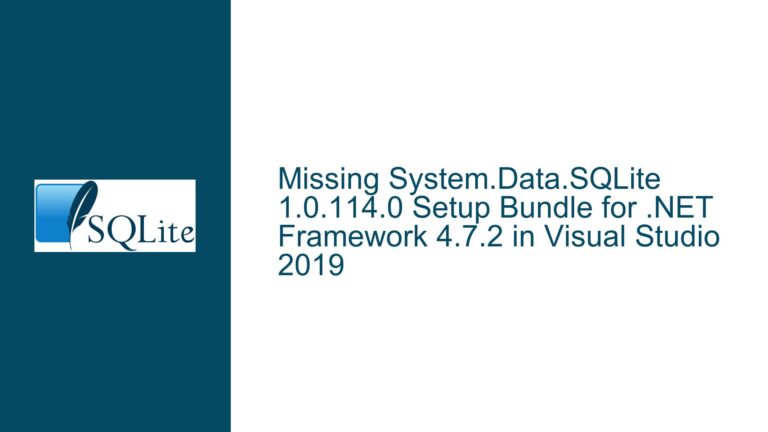SQLite Source Code Compatibility with C Standards: C89, C99, and Beyond
SQLite Source Code Compatibility with C89 and C99 Standards
SQLite, being one of the most widely used embedded database engines, is renowned for its portability, reliability, and lightweight design. A critical aspect of its portability is its compatibility with various C standards, which ensures that SQLite can be compiled and run on a wide range of platforms and compilers. The discussion around SQLite’s compatibility with C standards, particularly C89 and C99, reveals nuanced details about the codebase’s adherence to these standards and the compiler flags required to ensure successful compilation.
SQLite’s source code is primarily written in ANSI C, with a focus on maintaining compatibility with older C standards while also leveraging certain features from newer standards where necessary. The official documentation and community discussions indicate that SQLite is compatible with C89 (also known as ANSI C or C90) but also incorporates some features that are part of C99. This dual compatibility is achieved through careful coding practices and the use of compiler-specific flags to handle non-standard constructs.
The key takeaway is that SQLite’s source code can be compiled using both C89 and C99 standards, but certain compiler flags are required to suppress warnings or errors related to non-standard constructs. For example, the use of long long in SQLite’s source code is not strictly C89-compliant, but it is supported by most modern compilers in non-strict C89 mode. Similarly, SQLite’s use of implicit fall-through in switch statements and function pointer casting may trigger warnings in strict C89 mode, necessitating the use of additional compiler flags to ensure a clean build.
Compiler Flags and Non-Standard Constructs in SQLite
The compatibility of SQLite’s source code with C89 and C99 standards is heavily influenced by the compiler flags used during the build process. The discussion highlights several compiler flags that are essential for compiling SQLite without warnings or errors, particularly when using strict C89 mode. These flags address specific non-standard constructs in the SQLite codebase and ensure that the code compiles cleanly across different compiler versions and configurations.
One of the primary compiler flags discussed is -Wno-long-long, which suppresses warnings related to the use of the long long data type. This data type is not part of the C89 standard but is widely supported by modern compilers. By including this flag, developers can compile SQLite using the C89 standard without encountering warnings about the use of long long.
Another important flag is -Wno-implicit-fallthrough, which addresses warnings related to implicit fall-through in switch statements. SQLite’s source code includes switch statements where fall-through behavior is intentional, but this can trigger warnings in strict C89 mode. The -Wno-implicit-fallthrough flag suppresses these warnings, allowing the code to compile without issues.
Additionally, the discussion mentions the use of -Wno-cast-function-type to handle warnings related to function pointer casting. SQLite’s source code includes casts between different function pointer types, such as void (*)(void) and int (*)(void). These casts can trigger warnings in strict C89 mode, but the -Wno-cast-function-type flag suppresses these warnings, ensuring a clean build.
Finally, the -Wno-unused-parameter flag is mentioned as a way to suppress warnings about unused parameters in function definitions. SQLite’s source code includes interface-level parameters that may not be used by certain concrete implementations, and this flag prevents warnings about these unused parameters.
Ensuring Successful Compilation of SQLite Across Different Compilers
To ensure successful compilation of SQLite across different compilers and configurations, developers must carefully select the appropriate compiler flags and understand the nuances of SQLite’s compatibility with C standards. The discussion provides a detailed example of a command-line invocation for compiling SQLite using GCC with strict C89 mode, including the necessary flags to suppress warnings and errors.
The example command is as follows:
gcc -g -Wpedantic -Werror -Wall -Wextra \
-Wsign-compare -fPIC -std=c89 -Wno-long-long \
-Wno-implicit-fallthrough -Wno-cast-function-type \
-Wno-unused-parameter -c -o sqlite3.o sqlite3.c
This command includes several key flags:
-std=c89: Specifies that the code should be compiled using the C89 standard.-Wno-long-long: Suppresses warnings related to the use oflong long.-Wno-implicit-fallthrough: Suppresses warnings related to implicit fall-through in switch statements.-Wno-cast-function-type: Suppresses warnings related to function pointer casting.-Wno-unused-parameter: Suppresses warnings about unused parameters.
By using these flags, developers can compile SQLite’s source code using the C89 standard while avoiding warnings and errors related to non-standard constructs. This approach ensures that SQLite remains compatible with a wide range of compilers and platforms, maintaining its reputation as a highly portable database engine.
In conclusion, SQLite’s source code is compatible with both C89 and C99 standards, but certain compiler flags are required to handle non-standard constructs and ensure a clean build. By understanding the nuances of SQLite’s compatibility with C standards and using the appropriate compiler flags, developers can successfully compile SQLite across different compilers and configurations, ensuring its continued reliability and portability.






